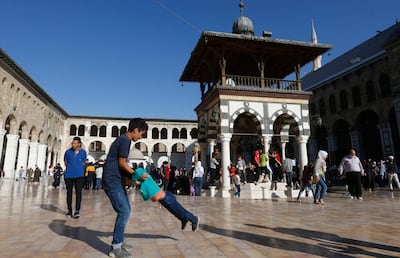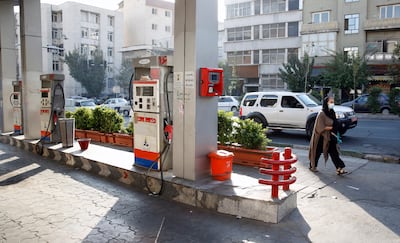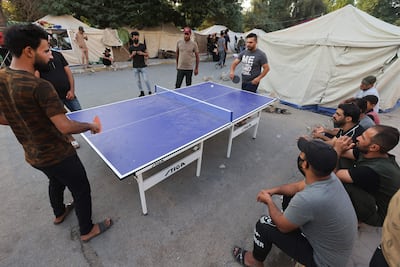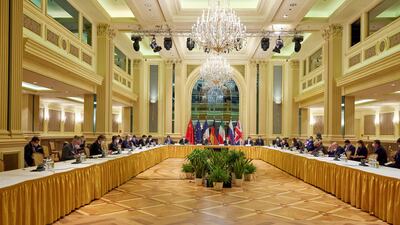As Iran seeks to consolidate its position regionally and internationally, its strategic visions are intersecting with negotiations, threats and diktats adopted by the Iranian leadership. At the same time, the Iranian regime is exhibiting a combination of anxiety, tension and triumphalism.
Iran’s neighbours are drawing strategies for economic growth, tourism, investment and coherent domestic change. As some of them seek to exit wars they have been implicated in, and launch regional dialogue such as Saudi-Iranian talks, Iran’s priority remains its nuclear programme and expansionist vision. It is an ideological, strategic and tactical priority that forms the raison d’etre of the regime in Tehran.
This is why Iran’s rulers are furious when elections in a country like Iraq produce results undesirable to Iran's Islamic Revolution Guard Corps (IRGC) – given Iraq’s crucial status in Iran’s regional expansionist project.
Likewise, Iran’s leaders will never allow Lebanon to fall outside the control of its executive partner Hezbollah, because Lebanon is an indispensable instrument in Iran’s strategy vis-à-vis Israel, whether to escalate (even if just verbally) or de-escalate.

After all, Syria has been taken off Iran’s hands and can no longer serve as a front with Israel, thanks to a Russian and American decision. This has been a source of great chagrin to Iran, not because Iran is serious about launching a military battle with Israel – which would be by proxy, anyway – but because Iran and Hezbollah’s huge military investments in Syria cannot be leveraged to use the latter as a front in the Iranian strategy. Rather, Syria has been leveraged primarily to further Russia’s strategy.
As a result, Lebanon has become dramatically more important to the Iranian project. One of Iran's strategic objectives is to domesticate Lebanon and confiscate its sovereignty. Yet, for different reasons, the US, Europe, Russia, China and some Arab nations have chosen not to comprehend the implications of this, amid full collusion or ignorance by Lebanon’s corrupt ruling cabal.
The fate of Lebanon in the equation of nuclear negotiations and regional dialogues has thus become far more complicated than the fate of Yemen, for example, given the priority of the latter in the Saudi-Iranian accords, should they come to fruition.
But what then are the features of the emerging grand strategy of major regional powers, led by Saudi Arabia and Iran? And what are the prospects for destruction and construction in the capitals of these powers and the capitals of their satellite nations, like Beirut, Baghdad and Damascus?
First, it is crucial to understand the emerging strategic vision of the Islamic Republic, following the elections and years of sanctions and isolation.

Here, “Iran for Iran” is the broad title of a revival project sought after by Iran’s rulers, whereby a new Iran is envisaged as a major military power backed by multilayered instruments of influence. The basis of this vision is an attempt to enhance Iranian identity domestically and developing it abroad so that Iran becomes a respected power, one that can wield influence far beyond the region.
This vision, however, clashes with the domestic policies that the Iranian regime often deploys against its own people, who are divided into two groups: one that is angry because of their living conditions as compared against those of other peoples, especially in the Gulf, where Saudis, Emiratis and Qataris reap the fruits of their countries’ resources to develop and invest in a free, high-tech future; and a second group that feels proud of their nation’s nuclear capabilities and ideological defiance of the west. It is the latter’s aspirations for Persian revivalism that the rulers of Iran want to capitalise on, if only to contain it and divert it away from challenging the ruling theocratical doctrine.
At the level of foreign policy, the ruling establishment in Iran perceives its interests as crucially dependent on Lebanon, Syria, and Iraq – in this order – remaining part of a pro-Iranian ecosystem. The rulers of Iran want to mobilise these countries’s political parties, movements, legal systems, force units, and mass media, to ensure a presence inside their governments to guarantee loyalty in their ranks to Iran’s national and security interests.
From the Iranian strategic point of view, this ecosystem must ensure stability, by having the pro-regime ecosystem ready to withstand foreign pressures, overcome local obstacles, and sustain a long-term national pro-Iranian domestication to serve stability in the Iranian sense.
According to the Iranian strategic vision, constructing this ecosystem is Iran’s responsibility and must use all channels and instruments, patiently and persistently, with inducements here and threats there, and by empowering local loyalist forces.
Iran is determined to never relinquish under any circumstances the trinity of its regional project: Lebanon, Syria and Iraq. Whether there is a setback here, or a victory there, the strategic decision is to "stabilise" Lebanon in the framework of Iranian dominance as a priority, followed by Iraq and Syria, all three of which countries are assigned a tailored strategy set forth by the IRGC.

Israel also has its own strategy. From the view of Iranian leadership, Israel must remain an enemy, to mobilise Muslim emotional support and justify Iran’s presence in the anti-Israel camp. Iran wants to also work with European countries to partially isolate Israel, leveraging their positions vis-à-vis the Palestinian issue. As Iran’s relations with Europe grow warmer and deeper, Tehran believes it may be able to influence European policies on Israel, through nuclear inducements – the magic wand to enchant Europe.
The cyber war being waged by Israel on Iran may not come out to the public, in the sense that either Iran or Israel would admit it, as this would mean escalating to direct military confrontation. Neither Iran nor Israel wants that, and both prefer proxy wars using Arab territories.
The second priority in the Iranian foreign policy strategy, after Lebanon, Syria and Iraq is the Gulf region. The first mission for Iran is to protect its presence there and control strategically the Gulf’s vital routes. Iran’s vision for the region is based on seeking mutual dependence with the Gulf countries instead of open confrontations.
Iran’s rulers understand well that their country is not yet a global player, but they want Iran to be a global influencer. In the meantime, Iran’s rulers believe regional infiltration is more important. Therefore, they believe it will be crucial to produce a positive impression of a new Iran that adopts a quiet strategy of "soft control", while building a comprehensive mechanism for influence. In Iran's view, this requires expanding the circle of friends to include moderates, and not just Russia and China, to propel Iran’s strategy forward.
The good news is that Iran’s new vision and strategy is not full of explicit threats, yet the Iranian policy vis-à-vis countries like Lebanon and Iraq are anything but "soft". Rather, it is a policy of full subjugation of these two countries to use them in the Iranian security belt.

Perhaps opening a new chapter with Saudi Arabia will lead to new accords on Yemen, where the war is being fuelled by the IRGC and Hezbollah, the Lebanese party that positions itself as Iranian ammunition. The Saudi-Iranian talks are dominated by military and security priorities. Yet the talks are crucial for the Gulf as well as Yemen, and perhaps later Lebanon, if only the likes of Lebanon's Lebanon's Information Minister George Kordahi stop publicising naive politics, show a sense of patriotism, and resign – at least out of respect for Lebanese expats eking out a living in the Gulf. His remarks in defence of the Houthis in Yemen, who threaten Saudi national security, expose his ignorance not just about the war in Yemen but also of the writing on the wall when it comes to regional and international negotiations.
Regional and international bargaining is at a peak these days, from the Vienna talks seeking to revive the nuclear deal with Iran, to regional negotiations, amid a tug of war between lenience and intransigence. For now, the fate of the polarisation and the outcome remain unknown.
But what is happening in the Arab Gulf states suggest their leaders are resolved not to be stuck in yesterday’s politics and confrontations. The major development projects for the Saudi capital Riyadh, unveiled during the Future Investment Initiative conference, and those of Abu Dhabi, are but two examples of the strategic priorities of these powerhouse nations, who have achieved something worthy of pause, by adopting a policy of economic and technological growth seeking to spread confidence and well-being among their citizens.
By contrast, the misery felt in Beirut, Baghdad and Damascus is proof of the failure of the Iranian doctrine, which has left Iran stuck in time if not taken it back four decades. But Tehran’s rulers do not care about the happiness of the Iranian people in Iran’s magnificent cities, or the happiness of people in Baghdad, Beirut, and Damascus. Still, one can only hope that the new strategy being developed in Iran will prompt them to peek at the breathtaking development of their neighbours. After all, nuclear weapons will not restore Iran’s magnificence, and destruction can never be a sustainable policy.


